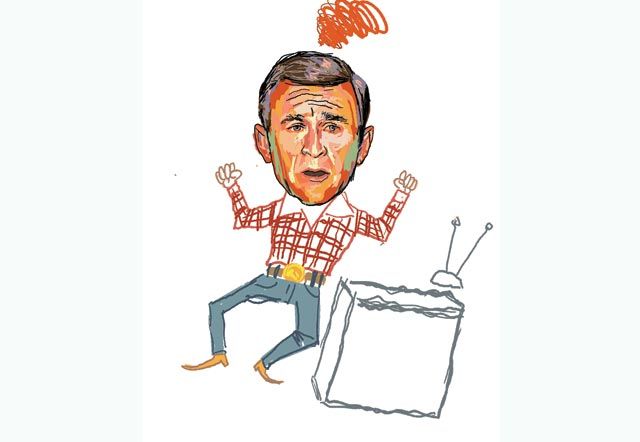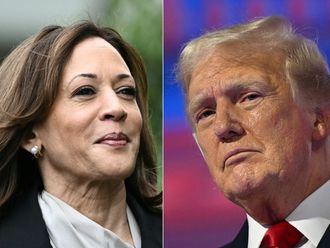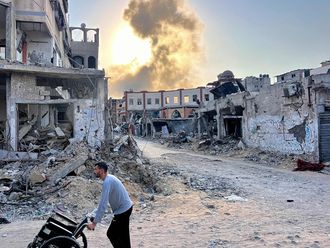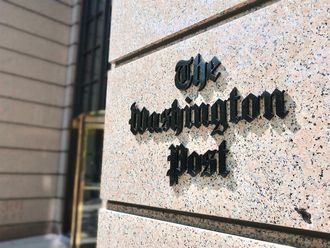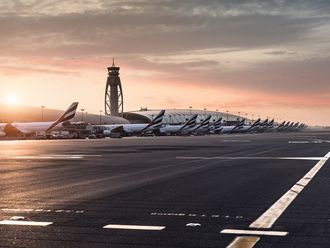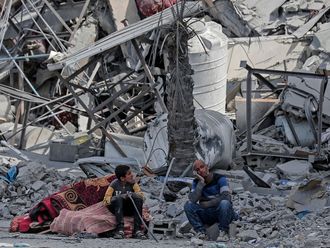If former US president George W. Bush had tuned in to the English broadcast on Syrian TV on Saturday he would clearly frown at seeing Lebanese Prime Minister Sa'ad Hariri in Damascus, being greeted warmly as a guest of honour by Syrian President Bashar Al Assad.
The footage would probably make him furious — that all attempts at breaking historic ties between Syria and Lebanon, and incriminating Syria for the murder of Sa'ad's father, Rafik Hariri, have vanished into thin air.
The last time Sa'ad Hariri was seen in Damascus was on June 13, 2000, attending the funeral of the late president Hafiz Al Assad along with his father. The young Sa'ad, aged 30 back then, warmly embraced President Bashar Al Assad, signalling how strong the Hariri family's relationship was with Syria.
Nearly 10 years down the road, Hariri came to Syria — again — this time in his capacity as the full-fledged prime minister of Lebanon, supported by a Cabinet that includes all of Syria's allies, Amal, Hezbollah, and the Free Patriotic Movement of General Michel Aoun.
Talk of Hariri's Syria visit had been in the air since the March 14 Coalition emerged victorious in the June parliamentary elections in Lebanon. Hariri clearly realises that in order for him to succeed as prime minister, he now has to act as a seasoned head of state, dealing with all of the heavyweights that influence the political football in Lebanon.
Apart from ‘breaking the ice' between both Syria and Lebanon, the Hariri visit has a dramatic impact on bilateral relations between both countries, and on the new Lebanese premier in particular.
Hariri's visit is a confidence booster for Syria's allies in Lebanon, mainly Hezbollah. The arms of Hezbollah will not be touched, as clearly stated by Hariri's Cabinet policy statement, and on the contrary, the Lebanese state will work to protect and embrace the Lebanese resistance — even if another war breaks out with Israel, as Israeli Prime Minister Benjamin Netanyahu has been threatening for months.
Improvement
The visit sends bilateral relations between Syria and Saudi Arabia into an open-ended honeymoon, given that relations had soured because of Lebanon in 2005-08. Now that agreement has been reached in Beirut, the two countries can concentrate on what unites them — in Iraq, Yemen, and Palestine — rather than what separated them in Lebanon.
The Hariri visit seals the fate of the International Tribunal that started in March 2008, investigating the murder of Rafik Hariri. Clearly, if the Syrians had anything to do with it, then evidence would have emerged to incriminate them by now, four years down the road.
The Americans realise this, and so do the French, the Saudis, and many in Lebanon. Even without saying "I was wrong" Hariri has effectively backed out on all accusations he fired at Damascus in 2005, blaming them for the murder of his father.
The visit also breaks the unholy alliance between Hariri and certain Christian politicians in Lebanon, like Ameen Gemayel of the Lebanese Phalange and Samir Gagea of the Lebanese Forces (LF), who are both furious with the Damascus visit.
The fact that Hariri mended broken fences with both Hezbollah and Syria made them furious — especially since this meant a new relationship between Hariri and Michel Aoun, who challenges both the Phalange and LF for supremacy of Christian Lebanon, and is strongly backed by Damascus.
Domestically, the Hariri Cabinet is expected to do wonders for Lebanon since regional heavyweights like Syria, Iran, and Saudi Arabia all want it to succeed.
Gulf money will come pouring for investment into Lebanon, aimed precisely at bolstering Hariri, while political support will come from Syria and Hezbollah — much needed for him to polish his image as a serious prime minister with talent and character, and not just the rich offspring of a former premier.
Too much is at stake for the Syrians and Saudis to let Hariri fall. The Saudis have invested too much in Lebanon. As far as the Iranians are concerned, so long as Hariri protects and embraces the arms of Hezbollah, they will leave him alone.
Tel Aviv connection
What can go wrong? The only player able to wreck the scene in Lebanon is Israel. The Israelis have been preparing for an all-out war with Hezbollah, to right the wrongs done to them during the war of 2006, and they are clearly not pleased by Hariri's Damascus visit.
If they do go to war, this would spell disaster for Hariri, given that Hezbollah is strongly represented in his government. Reportedly, shortly after Hariri's visit to Syria, Hassan Nasrallah will be visiting Saudi Arabia.
If the Saudis embrace Nasrallah in as much as the Syrians embraced Hariri, a perfect friendship — if the word applies — would surface on all three fronts, making it increasingly difficult for Israel to create problems.
The crossing of paths by the Syrians and Saudis has therefore, resulted in a new mood — a very good mood — in the Middle East, that will have immediate positive aftershocks on Lebanon in general, and on Sa'ad Hariri in particular.
- Sami Moubayed is editor-in-chief of Forward Magazine in Syria.


